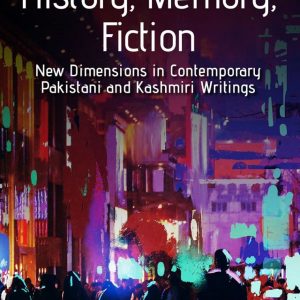South Asian Filmscapes By Elora Halim Chowdhury and Esha Niyogi De
South Asian Filmscapes
In South Asia, massive anticolonial movements in the twentieth century created nation-states and reset national borders, forming the basis for emerging film cultures. Following the 1947 Partition of India and Pakistan and the 1971 Bangladesh Liberation War, new national cinemas promoted and reinforced prevailing hierarches of identity and belonging. At the same time, industrial and independent cinemas contributed to porous and hybrid film cultures, reflecting the intertwining of South Asian histories and their reciprocal cultural influences.
South Asian Filmscapes excavates these complex politics and poetics of bordered identity through selected histories of cinema in South Asia. Several essays reveal how fixed notions of national identity have been destabilized by the cross-border mobility of filmed arts and practitioners, while others interrogate how filmic politics intersect with discourses of nationalism, sexuality and gender, religion, and language. Together, they offer a fluid approach to the multiple histories and encounters that conjure ‘South Asia’ as a geographic and political entity through a cinematic imagination.
$85.00 $75.00
5 in stock
Description
South Asian Filmscapes
In South Asia, massive anticolonial movements in the twentieth century created nation-states and reset national borders, forming the basis for emerging film cultures. Following the 1947 Partition of India and Pakistan and the 1971 Bangladesh Liberation War, new national cinemas promoted and reinforced prevailing hierarches of identity and belonging. At the same time, industrial and independent cinemas contributed to porous and hybrid film cultures, reflecting the intertwining of South Asian histories and their reciprocal cultural influences.
South Asian Filmscapes excavates these complex politics and poetics of bordered identity through selected histories of cinema in South Asia. Several essays reveal how fixed notions of national identity have been destabilized by the cross-border mobility of filmed arts and practitioners, while others interrogate how filmic politics intersect with discourses of nationalism, sexuality and gender, religion, and language. Together, they offer a fluid approach to the multiple histories and encounters that conjure ‘South Asia’ as a geographic and political entity through a cinematic imagination.
Author Description
Elora Halim Chowdhury is professor of women’s, gender, and sexuality studies at the University of Massachusetts Boston and author of Transnationalism Reversed: Women Organizing against Gendered Violence in Bangladesh.
Esha Niyogi De is a lecturer in English at UCLA and author of Empire, Media, and the Autonomous Woman: A Feminist Critique of Postcolonial Thought.
Additional information
| Weight | 1 kg |
|---|---|
| Binding | Paperback |
| ISBN # | 9789697343768 |
| Language | English |
| Pages | 312 |
| Publication Year | 2023 |
| Publisher | Oxford Publication |
| Writer | Elora Halim Chowdhury and Esha Niyogi De |
Related products
contact info
Phone : +92 300 4005555
Email : sales@allworldbooks.com
useful links





Copyrights © 2023 All Rights Reserved by "All World Books" 





Reviews
There are no reviews yet.